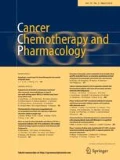To the Editor
Zaniboni and Formica recently published a review article considering preclinical and clinical data in the current context of optimal therapeutic sequences in metastatic colorectal cancer [1]. Their conclusions supported anti-EGFR agents as first-line treatment before anti-VEGF agents. Different biological and molecular treatment-conferred changes were advocated to support this order of drug combination. Surprisingly, an important aspect which was not considered by the authors is the current reconsideration of anti-VEGF and anti-EGFR effects through their respective and complementary abilities to modulate tumor immunity both directly and indirectly. For instance, on the one hand, involvement of T cells has been reported to be a component of the antitumor activity of EGFR-targeted monoclonal antibodies [2]. Also, EGFR activation has recently been shown to upregulate PDL-1 [3], potentially implying that EGFR inhibition can restore anti-tumor immunity. On the other hand, apart from its pro-angiogenic effect, VEGF must also be considered to be a strong immunosuppressor agent [4] and VEGF-targeted therapy has been shown very recently to combine favorably with checkpoint inhibitors based on pronounced CD8+ T cells tumor infiltration boosted by the anti-angiogenic drug [5].
Taken all together, these different features must lead us to reconsider anti-VEGF and anti-EGFR combinations, focusing not only on the association but also on the prospect of perspective for combinations with immunomodulatory agents like checkpoint inhibitors.
References
Zaniboni A, Formica V (2016) The Best. First. Anti-EGFR before anti-VEGF, in the first-line treatment of RAS wild-type metastatic colorectal cancer: from bench to bedside. Cancer Chemother Pharmacol. doi:10.1007/s00280-016-3032-8
Yang X, Zhang X, Mortenson ED et al (2013) Cetuximab-mediated tumor regression depends on innate and adaptive immune responses. Mol Ther 21:91–100
Chen N, Fang W, Zhan J et al (2015) Upregulation of PD-L1 by EGFR activation mediates the immune escape in EGFR-driven NSCLC: implication for optional immune targeted therapy for NSCLC patients with EGFR mutation. J Thoracic Oncol 10:910–923
Motz GT, Coukos G (2011) The parallel lives of angiogenesis and immunosuppression: cancer and other tales. Nat Rev Immunol 11:702–711
Hodi FS, Lawrence D, Lezcano C et al (2014) Bevacizumab plus ipilimumab in patients with metastatic melanoma. Cancer Immunol Res 2:923–931
Author information
Authors and Affiliations
Corresponding author
Rights and permissions
Open Access This article is distributed under the terms of the Creative Commons Attribution 4.0 International License (http://creativecommons.org/licenses/by/4.0/), which permits unrestricted use, distribution, and reproduction in any medium, provided you give appropriate credit to the original author(s) and the source, provide a link to the Creative Commons license, and indicate if changes were made.
About this article
Cite this article
Milano, G. Anti-VEGF and anti-EGFR agents open up new horizons changing the landscape for their associations. Cancer Chemother Pharmacol 78, 245 (2016). https://doi.org/10.1007/s00280-016-3081-z
Received:
Accepted:
Published:
Issue Date:
DOI: https://doi.org/10.1007/s00280-016-3081-z

